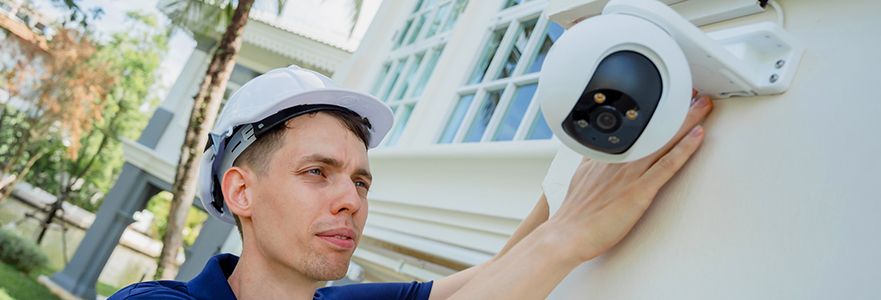Outdoor Security Cameras: A Complete Guide to Home Surveillance

DIY vs Professional Home Security: What’s Best for Your Home?
Choosing between DIY and professional home security installation represents a crucial decision for homeowners. At Moore Protection, we understand that every homeowner’s security needs are unique, and we’re committed to helping you make an informed choice. This comprehensive guide explores the key differences between DIY and professional security systems, ensuring you can select the option that best protects your home.
Understanding Modern Home Security Needs
The landscape of home security has evolved significantly in recent years, with both DIY and professional solutions becoming increasingly sophisticated. Modern security threats demand comprehensive protection strategies for various vulnerabilities, from traditional break-ins to more sophisticated security challenges. As technology advances, the choice between DIY and professional installation becomes more nuanced, requiring careful consideration of multiple factors.
The rapid evolution of security technology has made DIY and professional systems more sophisticated than ever. Modern systems now integrate smart home features, mobile connectivity, and advanced detection capabilities, regardless of installation method. However, the effectiveness of these features largely depends on proper installation and configuration, making your choice of installation method crucial to your home’s security.
DIY Home Security Systems
The appeal of DIY security systems often centers on their perceived cost savings and flexibility. Modern DIY systems have user-friendly interfaces and wireless components that promise easy installation. Many manufacturers provide detailed instructions and online support to guide homeowners through the setup process. These systems typically include basic components such as door sensors, motion detectors, and wireless cameras communicating through your home’s internet connection.
However, DIY installation requires careful planning and basic technical knowledge. Homeowners must determine optimal sensor placement, establish reliable wireless connections, and ensure proper integration with mobile apps and monitoring services. While many DIY systems offer plug-and-play simplicity, achieving comprehensive coverage often proves more challenging than initially expected, particularly in larger homes or properties with complex layouts.
Professional Security Systems
Professional security systems represent a comprehensive approach to home protection. These systems typically incorporate more sophisticated technology and offer seamless integration of multiple security layers. Professional installers bring extensive knowledge of security vulnerabilities, enabling them to recommend and implement solutions tailored to your property’s needs. Their expertise ensures the optimal placement of sensors, cameras, and other security devices while accounting for blind spots, wireless signal strength, and potential entry points.
The installation involves thorough property assessment, custom system design, and professional-grade equipment installation. Technicians test all components extensively, ensuring reliable operation and proper communication with monitoring centers. This attention to detail often results in more reliable system performance and fewer false alarms than DIY installations.
Cost Considerations and Long-term Value
Initial costs often drive homeowners toward DIY systems, but the total investment picture extends beyond the purchase price. DIY systems generally require lower upfront payments, especially when choosing basic equipment packages. However, additional components, upgraded features, and potential reinstallation due to setup issues can increase overall expenses. Some DIY providers also require lengthy monitoring contracts that may offset initial savings.
Professional installation typically commands higher upfront costs but often delivers superior long-term value. Professional systems usually incorporate higher-quality equipment with longer operational lifespans. Many insurance providers offer more substantial premium discounts for professionally installed systems, recognizing their enhanced reliability and monitoring capabilities. Additionally, professional installation typically includes ongoing support and maintenance services that can prevent costly system failures.
Installation Process and Technical Requirements
DIY installation demands time, patience, and basic technical skills. Homeowners must understand wireless networking, mobile device configuration, and basic security principles. The process typically involves mounting sensors, connecting devices to home networks, and programming system parameters. While manufacturers strive to simplify these tasks, unexpected challenges often arise during installation, potentially compromising system effectiveness.
Professional installation eliminates technical burdens while ensuring optimal system performance. Trained technicians handle all aspects of installation, from initial planning through final testing. They understand overcoming common installation obstacles, such as wireless interference or challenging mounting locations. Professional installers also provide comprehensive system training, ensuring homeowners can confidently operate their security systems.
System Support and Maintenance
Ongoing system support plays a crucial role in maintaining effective home security. DIY system owners must often troubleshoot problems independently, relying on manufacturer support lines or online resources. Software updates, equipment replacements, and system modifications become homeowner responsibilities, potentially leading to temporary security gaps during maintenance.
Professional security providers offer comprehensive support services, including regular maintenance, rapid repair response, and system upgrades. Technicians can quickly identify and resolve issues before they compromise security. Professional monitoring services provide continuous oversight, ensuring prompt alarm response while minimizing false alerts through expert system management.
Making the Right Choice for Your Home
The decision between DIY and professional security installation should reflect your specific circumstances, technical comfort level, and security requirements. While DIY systems can provide basic protection for tech-savvy homeowners with simpler security needs, professional installation offers superior protection and peace of mind for most properties.
At Moore Protection, we recognize that every home requires a unique security solution. Our experienced team can help evaluate your specific needs and recommend the most effective security approach for your property. Whether you’re considering a new security system or upgrading existing protection, we provide the expertise needed to make an informed decision.
Contact Moore Protection today to discuss your home security options. Our security experts will guide you through available solutions, helping you choose the protection that best serves your home. Let us help you achieve the peace of mind with knowing your property is secured by proven professionals.


